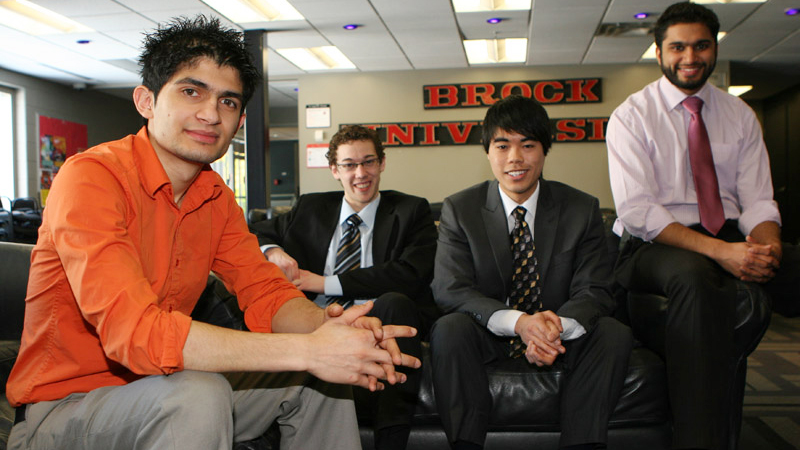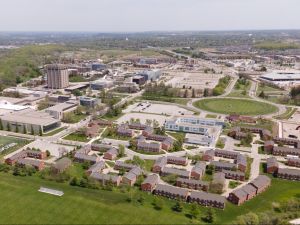
From left: Sohail Ahmed, Sebastian Prins, Kenneth Truong, Daud Grewal
Improving community relations and getting into the real estate business are two goals of the recently elected Brock University Students’ Union (BUSU) executive.
The union would like to continue with efforts established by previous executives to improve relations with St. Catharines and Thorold residents, said president-elect Sohail Ahmed, who served in 2009/10 as vice-president of student services.
Ahmed would also like to see a BUSU-owned off-campus residence, a concept that has been successful at other universities, he said. The residence would be not-for-profit and not limited to first-year students. Students would be able to rent a room at cost.
“We’d like to become the landlord, rather than students complaining about their landlords,” he said.
Ahmed will lead the executive, comprised of four paid positions, for 2010/2011. He is a third-year Business Administration student from Niagara Falls. At 20, he is a business owner twice over (Momo Cars Inc., See Sight Tours) and president of Guinness Brock, the club behind Brock’s Guinness World Record of the most people playing air guitar at once. With a total of 2,570 votes cast in the February election, Ahmed received 1,179 votes, besting incumbent Lianne Bradley’s 759 votes and Daryl Paulin’s 536 votes.
Daud Grewal, new vice-president of university affairs, is also a Niagara Falls native. He is 21 and in his third year of Political Science. He won with 50.4 per cent of the popular vote.
Kenneth Truong, 20, is a third-year Business Administration student who hails from Brampton. He was elected vice-president of student services with 44.1 per cent of the vote.
Sebastian Prins, 20, is also from Brampton and is a third-year Business Administration student with a concentration in Organizational Behaviour. He is the vice-president of finance and administration and received 54.5 per cent of the vote.
Grewal said one of his goals is to promote BUSU within the student population, because “there are a lot of students out there who are simply unaware of what BUSU does.” He’d also like to reform the Brock University Students’ Administrative Council (BUSAC) to make it more effective, and encourage students to take part in the “40 Neighbours Program,” which would see them getting to know at least 40 of their neighbours.
Prins would like to see more community partnerships, and will work heavily on partnership packages. Truong would like to increase student awareness and involvement, and see an effective online database of events that students can reference.
Ahmed, who campaigned on bringing the “next big thing” to Brock students, was pleased with the major evaluation of the clubs budget in the past year, when the last BUSU election saw students approve a $140,000 levee for clubs. BUSU has implemented a two-day mandatory training program for club presidents that has attracted the attention of other university student unions.
There is also a long-term goal of expanding the student centre so the offices of clubs and associations can be centralized, Ahmed said.










What a waste of time and money. Far too much already goes to BUSU, and if they think students want to pay increased tuition so that they can start up a party house for those students who are too lazy to work for rent money, they are sorely mistaken. Those of us with REAL responsibilities cannot afford such socialist garbage.
I would love to know where this guy got his facts from, consdering increased tuition has nothing to do with anything on this subject. Another thing and probably the most important is that I work two jobs at times and work my behind off trying to afford to go to school and pay my rent money, so for someone to say that this will be a party house for lazy students is ridiculous and truly the most ignorant thing I’ve heard today. Do your research please before you make dumb comments, otherwise you just make yourself look stupid. Thanks and have a great day, love from a very ENERGETIC, HARDWORKING, DEDICATED AND APPRECIATE STUDENT :).
I’m sorry, but if you’re working two jobs, getting OSAP, applying for all the grants, bursaries, and scholarships you can, and you still can’t afford school/rent, you need to re-think your expenses. The maximum amount OSAP gives is something like $17000. Add to that a $5000 line of credit from the bank (easy to get if you have TWO jobs), $3000 from scholaries, bursaries and grants, and $12800 from your TWO jobs (assuming they amount to roughly 24 hours per week, the average part-time amount), we’re talking about $37800, TAX FREE.
Many adults with full-time jobs and families to support find a way to live on as much, so if you can’t then, like I said, you need to re-think your budgeting.
Sorry Brandon, if that is how OSAP worked and the provincial and federal government gave out up to $17,000 to students who had jobs and subsequently were able to receive scholarships and bursaries along with parental contributions and private loans then yes you are right students could potentially have, according to your calculations, $37,800.
However that is not the case. No student would be able to receive $17,000 along with all those other sources of income.
The only student that could potentially receive the maximum $17,000 is if the student’s parents did not make enough money to cover their own basic necessities and the basic necessities of their dependents or do not qualify to receive any parental contributions for a variety of reasons like age. If the student did not work at all during the school year and received no income from a summer job. If the student did not own any assets, principle dwellings, or business holdings (i.e RRSP’s, any property, etc.) If they were living far enough away from home that it would cost up to or more than $600 for two round trips a year. If they did not receive any scholarships and bursaries other than government grants which would be included in the maximum $17,000. Along with many other minute details like the cost of living in the region the university or college is located.
Within this assessment, only a student who has no other source of income to cover for food, residence, cost of education, and the cost of living would receive the maximum of $17,000. In this assessment students are expected to live below the poverty line with assessments like expecting students to live on only $7.50 for food a day.
The very few that do qualify for the maximum $17,000 is because they have no other source of income and are in dire need. For them this $17,000 is still not enough to cover their daily living expenses yet they still struggle through it.
And say a student wanted to work to cover their living expenses that the $17,000 is not enough to cover what happens is that anything that students make beyond $50/week is clawed back dollar for dollar.
I understand that the information on OSAP and how it works is not readily available but trust me when I say that it is not easy for students and it is especially not easy for those students with families who want to go back to school to improve their standard of living for themselves and their children.
hey daud.
Is there a way to change the $50/week rule? I mean, if it’s a BUSU concept, then there must be a way around it (or reform), but is there any means of standing up to it?
Yeah UNFORTUNATELY things don’t always work out so perfectly for some with OSAP and your calculations are way off taking into other unique situations. You cannot generalize this way, it leads to prejudism. How do you know I don’t have medical issues that prevent me from working months at a time? How do you know if OSAP decides I’m a dependent even though I receive no financial support whatsoever from my parents? Or if I’m in debt from 4 years ago from things that were out of my control and therefore can’t get a handy dandy line of credit like you say? I can’t even argue with this Brandon person, because it will get me nowhere. Basically, it’s laughable to say that there are not students going through the same thing I am who struggle every single day and don’t get free handouts. And I also don’t see him defending his “rising tuition” argument. Ignorant.
Oh please. I have no sympathy for those of you moaning about not having enough money if you’re getting support from your parents. If you have kids, you’re married, or you don’t live with your parents, OSAP does not factor in your parents’ income AT ALL.
Daud, I know a thing or two about how OSAP works as well. Believe me, I use OSAP funding to its fullest, being a father of two with a wife who is a stay-at-home mother. It really is not that difficult for ME, so I can’t imagine how easy it would be for some kid who either lives with their parents rent-free or else lives with 3 roommates and pays practically nothing for rent and lives off beer and popcorn.
Try paying $1000+ rent ON YOUR OWN with no roommates (plus utilities), supporting a whole family, while attending school full-time. I do it, and never complained once, so I can’t stand when kids who can’t afford the latest Apple handheld-gadget, or a RAM upgrade for their brand-new Macbook, whine about how difficult their lives are. Give me a break.
This could be one of the best initiatives- if BUSU does go through with the off campus residence! In first year when I tried to move out onto residence I became very aware of the limited spaces available to students. Finding off-campus housing is not always the most convenient option as unnecessary problems usually arise with landlords somewhere during the year. Having an off campus residence would not only offer students with another option of where to live- but also provide an opportunity for new retail spaces. Mac has off campus housing already in operation- why can’t Brock when we are considered one of the MOST UNDERSPACED UNIVERSITY’S IN CANADA. I’m glad our students’ union recognizes there is a limited space issue on our campus- and has taken initiative to address the problem and find a feasible solution. Good Job!!
As for Brandon, to generalize the student population as popcorn eating beer drinking individuals is simply ignorant. And as for OSAP it doesn’t cover for students whose parents make X amount of dollars and decide not to share with their children attending university. Working a job on the weekend, while constantly juggling business courses, presentations, group meetings AND balancing multiple extracurriculars is quite the challenge. Classifying us all to look like irresponsible, lazy ‘beer drinkers’ is offensive to me. You should realize this misconception of the typical student does not apply to us all (In fact it is most likely these students who drop out) , and is a negative and incorrect perception of the student body- especially coming from a student like yourself. So in summary, kudos to BUSU for this initiative!
Being a recent graduate, I must admit that I have found your article very interesting. Accommodation can indeed be a daunting experience for all the first year students. I strongly agree with your insights and ideas regarding the off-campus residence. I don’t think it is a waste of time or money. I find BUSU’s work inspiring and challenging. It should be appreciated. Wish you all the best with the project.